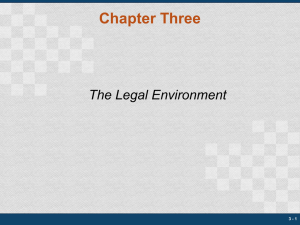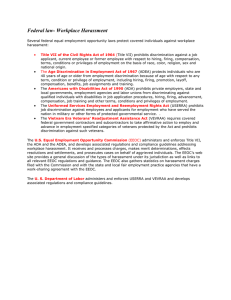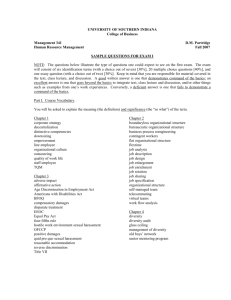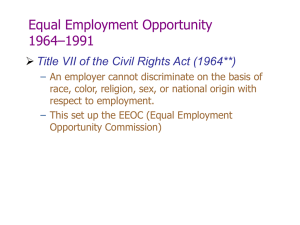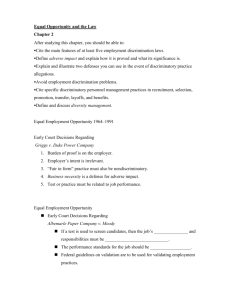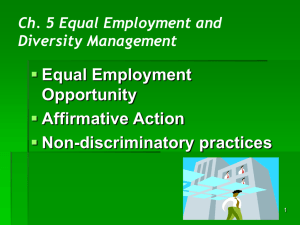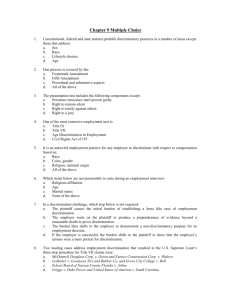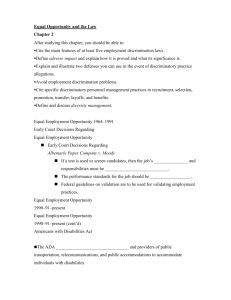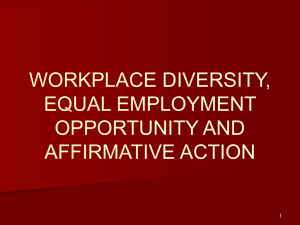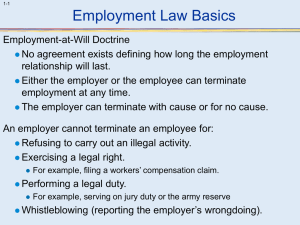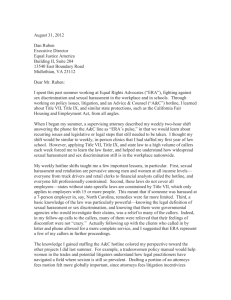Chapter 02 HR - UCO College of Business
advertisement
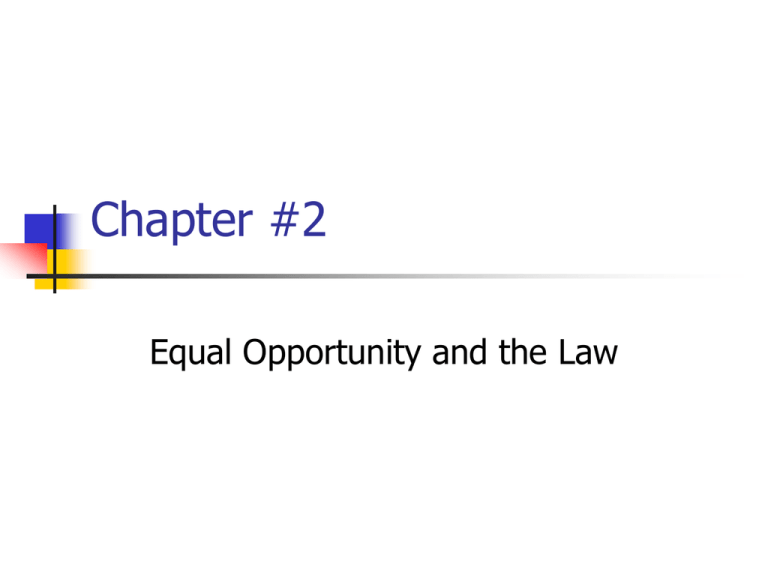
Chapter #2 Equal Opportunity and the Law Title VII of the l964 Civil Rights Act ….Banned discrimination on the basis of race color, religion, sex or national origin with respect to employment Hiring, firing, promotions, length of employment Equal Employment Opportunity Commission EEOC EEOC was created by Title VII is empowered to investigate,job discrimination compliant and sure on behalf of complainant Covers all private and public firms with more than 15 ees EEOC has 5 members that serve five year terms Appointed by president with the consent of senate. Receives complaints, investigates then attempts to conciliate before enforcing the law. Executive Orders 11246,11375 Required employers to go beyond Title VII..affirmative action. Covers all federal contractor over 50,000$ or 50 or more ees. Enforced by Office of Federal Compliance OFCCP Equal Pay Act No discrimination in pay on the bases of gender Equal pay for equal work, similar working conditions. Age Discrimination Act ADEA 1967 Prohibited discrimination due to age. 1963 40 – 65 1974 removed any age cap O’connor v. Consolidated Coin if ee is over 40 may sue if replace by someone significantly younger even if ee is replace by another who is over 40 Vocational Rehabilitation Act l973 Affirmative action for disabled if equally qualified unless “undue hardship of the employer Does require accommodation Vietnam Era Readjustment Assistance Act l974 Requires that employers with government contracts take affirmative action to hire disabled veterans. Enforcement agency is the OFCCP Contracts over $10,000 Pregnancy Discrimination Act l978 Requires that child birth must be covered under insurance and treated like any other disability. Women are granted unpaid leave and equal job back. Federal Agency Guidelines Also called uniform guidelines that are set forth for employers to follow in in matters like employment selection tools, sexual harassment testing etc. Sexual Harassment Interference with a persons ability to work , to keep job or promotion Submission Female to male Female to female Male to male Sexual Harassment cont. Test for liability Did firm know? Should it have known? Did it take action? Three ways to prove S.H. Quid Pro Quo Hostile Environment by supervisor Hostile environment by coworker What should HR Do? Take all complaints seriously. Issue strong policies. Have compliant procedure Training sessions Discipline those involved. Keep records Encourage upward communication What should employee do? First say “no” Second, write letter to accused. Third, file a report if it continues. Then file EEOC claim. If all fails then lastly get a lawyer. Federal Violence Against Women Act of l994 Provides that a person who commits a crime of violence motivated by gender shall be liable to the party injured . Is another avenue for women against violence Early Court Decisions Regarding EEO Protected Class Persons protected by Title VII Landmark case: Griggs v. Duke Power Screening: coal miner had to be high school graduates. Not necessary. Testing must be job related. ER liable even if NO intent to discriminate. Qualifications must be job related .” Business necessity” Tests must have validity Case: Albermarle Paper v. Moody Test validity had to relate to specific duties. Job performance standards had to be standardized. Wards Cove Packing v. Atonio Alaskan canneries discrimination; whites had better jobs. Burden of proof is on employee to prove employer’s practices were NOT based in business necessity. Civil Rights Act of 1991 Put burden of proof back on the employer. It made it more important for employers to adhere to the letter of the EEO law Money damages for disparate treatment Compensatory and punitive $ for intentional discrimination. No testing adjustments for minorities. Americans With Disabilities Act Reasonable accommodation Disabled must have “essential skills” Undue hardship (costs of accommodation must not be greater than the benefits) Impaired for one or more “Major Life Activities” Qualified individuals (with necessary skills, and qualifications) Not covered under ADA Homosexuality Bisexuality Gambling Drug usage Mental impairments are covered. and are the greatest number of claims. Depression, anxiety, panic disorders, obsessive compulsiveness, Employer obligations Employee must have essential skills Do not have to lower standards Must not ask about disability only “Can you perform the job?” Can not ask. Do you have aids, What perscription drugs are you taking? Have you ever filed for workers comp? Have you been treated for mental illness? Carpal tunnel is no longer consider a disability Walmart just paid a$ 750,000 fine for failing to hiring someone hearing impaired. Which of the following is not covered by Title VII of the Civil Rights Act? A. Religion B. Race C. Age How many members of the EEOC are there? A. 5 B. 4 C. 6 The ADEA makes it unlawful to between the ages of A. 40 to 70 50 to 65 40 and up without any cap The ___set forth highly recommended procedures regarding matters like employee selection, record keeping, pre employment inquiries and affirmative action plans A. Equal Pay Act B. Uniform Guidelines C. Executive Orders Which would not be a cause for a sexual harassment charge? A. Unwelcome advances B. Verbal conduct of a sexual nature C. Asking another employee to go to dinner In the context of sexual harassment, the courts may decide ___exists even if no direct threats or promises are made in exchange for sexual behavior A. A hostile environment B. A quid pro quo C. A BFOQ A ___ is persons such as minorities and women covered by equal opportunity laws including Title VII A. Control group B. Protected class OFCCP The Albemarle Paper Co v. Moody case required employers to A. Lower their selection requirements B Validate job tests. C. Validate application forms The ____places the burden of proof back on employers and permits compensatory and punitive damages A. ADA B. Civil Rights Act of l991 C. Title VII 1964
